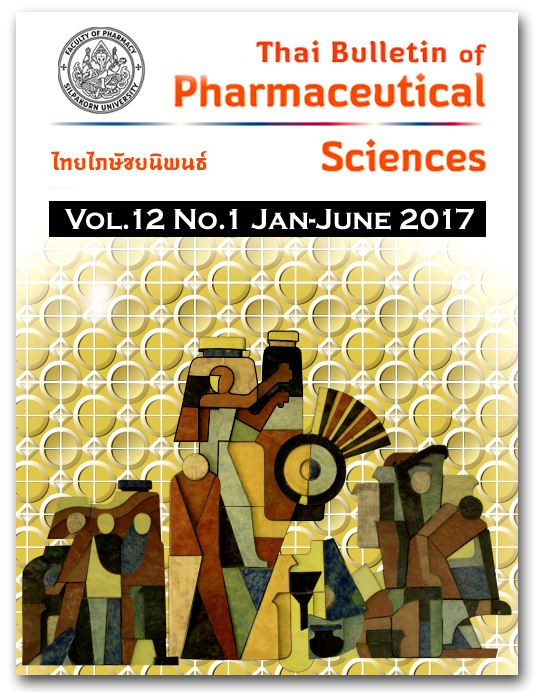ผลการบริหารเวชภัณฑ์ยาจากการปรับระบบงบประมาณยาจากสมุนไพรของโรงพยาบาลชุมชนในจังหวัดสุราษฎร์ธานี (EFFECTS OF DRUG INVENTORY MANAGEMENT ON MODIFICATION IN HERBAL MEDICINE BUDGETING OF COMMUNITY HOSPITALS IN SURAT THANI PROVINCE)
DOI:
https://doi.org/10.69598/tbps.12.1.1-15Abstract
การวิจัยนี้เป็นการวิจัยเชิงสำรวจ เพื่อเปรียบเทียบผลการบริหารเวชภัณฑ์ยาสองระบบงบประมาณของโรงพยาบาลชุมชน (รพช.) 19 แห่งในจังหวัดสุราษฎร์ธานี ได้แก่ ระบบงบประมาณยาสมุนไพรที่ใช้งบอุดหนุนสมุนไพรซึ่งสำนักงานสาธารณสุขจังหวัด (สสจ.) จัดสรรจากงบประกันสุขภาพรวมของทุก รพช. (“ระยะงบอุดหนุน”) ซึ่งดำเนินการในช่วง เดือนพฤษภาคม 2555 – เมษายน 2556 และระบบงบประมาณที่โรงพยาบาลต้องรับผิดชอบมูลค่าเบิกจริงของหน่วยงานตน (“ระยะปรับทวนงบ”) ซึ่งดำเนินการช่วงพฤษภาคม 2556 – เมษายน 2557 เครื่องมือที่ใช้เก็บข้อมูลคือ แบบบันทึกข้อมูลทั่วไปและข้อมูลบริหารเวชภัณฑ์โรงพยาบาล วิเคราะห์ข้อมูลทั่วไปด้วยสถิติเชิงพรรณนา ร้อยละ ค่าเฉลี่ย และส่วนเบี่ยงเบนมาตรฐาน วิเคราะห์ความแตกต่างระหว่างค่าเฉลี่ยของสัดส่วนการซื้อยาจากสมุนไพร สัดส่วนเบิกใช้ยาจากสมุนไพร และอัตรายาคงคลัง ในสองช่วงเวลาที่ดำเนินระบบงบประมาณแตกต่างกัน โดยใช้สถิติเชิงอนุมานได้แก่ Dependent sample t-test และ Wilcoxon’s Signed Rank Test พบว่าโรงพยาบาลส่วนใหญ่มีมูลค่าคลังยาเฉลี่ยลดลงในระยะปรับทวนงบ โดยลดลงอย่างมีนัยสำคัญทางสถิติ 9 โรงพยาบาล ส่วนใหญ่มูลค่าซื้อยาเฉลี่ยต่อเดือนลดลง และลดอย่างมีนัยสำคัญทางสถิติ 7 โรงพยาบาล มีเพียง 4 โรงพยาบาลเท่านั้นที่มีมูลค่าเบิกใช้ยาเปลี่ยนแปลงอย่างมีนัยสำคัญ โดย 1 ใน 4 มีมูลค่าเบิกใช้เฉลี่ยเพิ่มขึ้น ผลการเปรียบเทียบค่าเฉลี่ยของร้อยละการจัดซื้อและเบิกใช้ยาจากสมุนไพรรวมทุก รพช. พบว่า มูลค่าซื้อลดลงจากร้อยละ 19.57 เป็น 5.85 (p-value<0.001) และมูลค่าการใช้ลดลงจากร้อยละ 16.91 เป็น 8.13 (p-value<0.001) ค่าเฉลี่ยอัตรายาคงคลังรวมทุก รพช. ลดลงจาก 2.70 เดือน เป็น 2.35 เดือน (p-value<0.001) สรุปว่า ผลการบริหารเวชภัณฑ์ยาของ รพช. ในจังหวัดสุราษฎร์ธานีมีการเปลี่ยนแปลงเมื่อปรับเปลี่ยนระบบเบิกจ่ายงบประมาณยาจากสมุนไพร การนำผลบริหารเวชภัณฑ์ที่เปลี่ยนแปลงมาพิจารณาร่วมในการจัดการงบประมาณค่ายาจากสมุนไพร จะช่วยเพิ่มความคุ้มค่าเหมาะสมได้
This research aimed to compare the different effects of drug inventory management between 2 budget systems used in 19 community hospitals in Surat Thani, Thailand. The budget systems consisted firstly of a herbal medicine budget system, which was managed and provided by the Surat Thani Provincial Public Health Office. The budget management was allocated from the Universal Coverage (UC) fund of all community hospitals (Grant-in-aid process), and the herbal medicine budget system was conducted from May 2012 to April 2013. Secondly, a self-managed hospital budget management system was provided by each individual organization (revised budget process) and was conducted from May 2013 to April 2014. The instruments used to collect data and the data collection procedures consisted of a general data form and a drug management data form. This research analyzed background data with descriptive statistics: percentage, mean, and standard deviation. It also analyzed the differences between the means of herbal drug purchasing proportions, herbal drug dispensing proportions and stock months which were conducted during the different periods of budget management. Data were analyzed by using a Dependent sample t-test and Wilcoxon’s Signed Rank Test. The results of these analyses showed that most community hospitals had a lower mean stock value after the revised budget process. Stock value decreased significantly in 9 hospitals. Most community hospitals showed a reduction in their drug purchasing average per month. Additionally, 7 community hospitals decreased their drug purchasing values to a statistically significant degree. Only 4 community hospitals showed a statistically significant change in drug dispensing values. 1 out of the 4 community hospitals showed a higher mean dispensing value. The comparative results of average percentages between herbal purchasing and herbal dispensing values from all community hospitals showed that purchasing values decreased from 19.57% to 5.85% (p-value <0.001) and dispensing values decreased from 16.91% to 8.13% (p-value <0.001). Average stock lead times for all community hospitals decreased from 2.70 to 2.35 months (p-value <0.001). Based on the findings of this research, it was concluded that the effects of the drug inventory management of community hospitals in Surat Thani was modified when community hospitals changed the disbursement system of their herbal medicine budgets. The results of the modifications showed that the new system could improve the efficiency and proper management of the community hospitals.
Downloads
Published
How to Cite
Issue
Section
License
All articles published and information contained in this journal such as text, graphics, logos and images is copyrighted by and proprietary to the Thai Bulletin of Pharmaceutical Sciences, and may not be reproduced in whole or in part by persons, organizations, or corporations other than the Thai Bulletin of Pharmaceutical Sciences and the authors without prior written permission.



